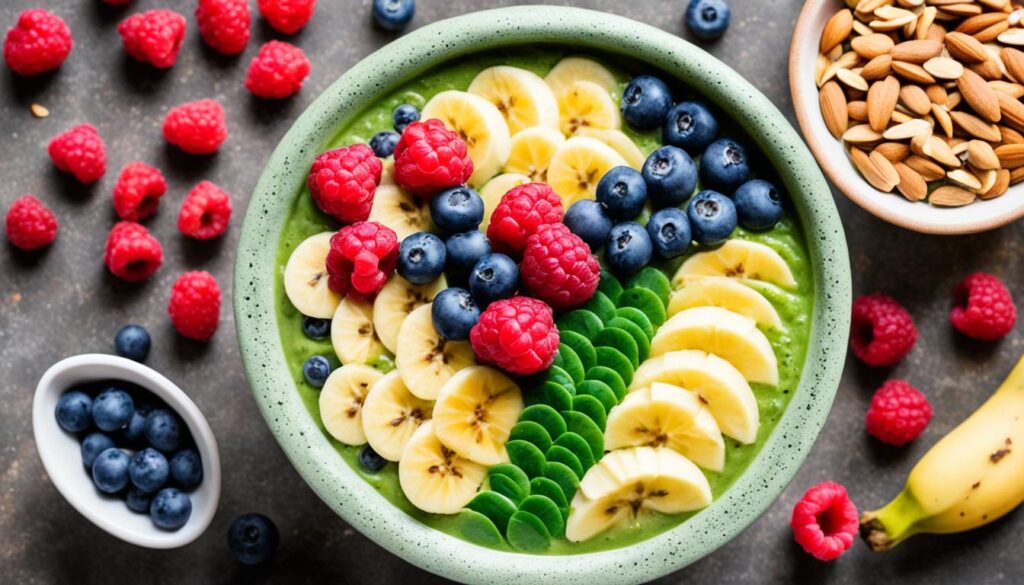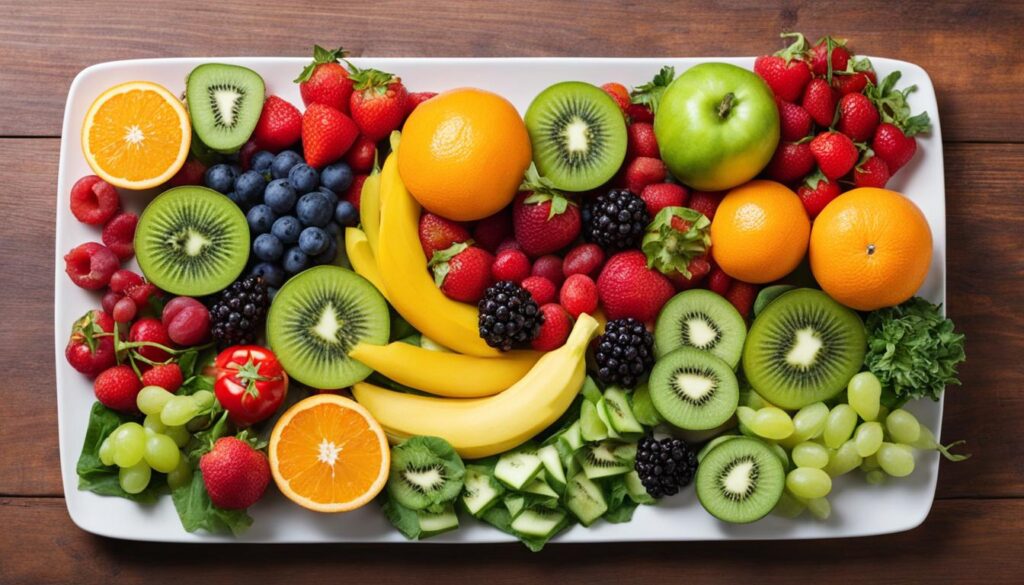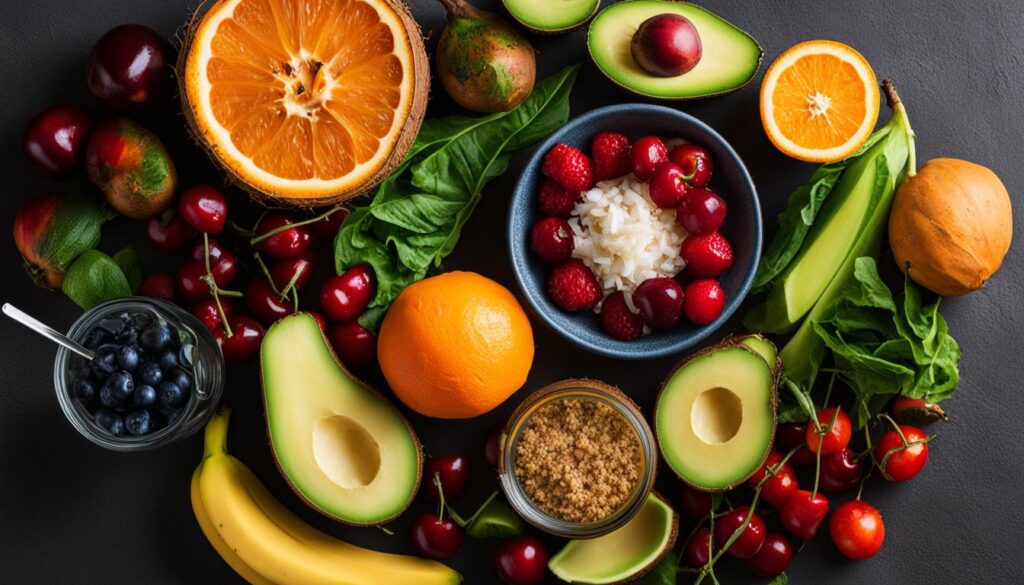Muscle cramps can be a painful and inconvenient issue for many people. While the exact cause of muscle cramps is not always known, factors such as poor physical conditioning, mineral imbalances, dehydration, and tight muscles may contribute to their occurrence.
However, incorporating certain foods into your diet can help prevent leg cramps. Let’s explore the best foods to eat to avoid leg cramps.
- Eating foods rich in calcium and vitamin D can support muscle health and prevent leg cramps.
- Magnesium-rich foods can also help reduce the chances of experiencing muscle cramps.
- Including potassium-rich foods in your diet can support proper muscle contraction and relaxation.
- Consuming electrolyte-rich foods and drinks can help maintain the balance necessary for muscle function.
- Lean protein sources aid in muscle recovery and can prevent muscle cramps.
- Avoiding processed foods can reduce the likelihood of muscle cramps.
Key Takeaways:
- Incorporate calcium-rich foods like milk and leafy greens into your diet to support muscle health and prevent leg cramps.
- Include magnesium-rich foods such as seeds and nuts to reduce the chances of experiencing muscle cramps.
- Eat potassium-rich foods like bananas and avocados to support proper muscle function and prevent cramps.
- Consume electrolyte-rich foods and drinks like coconut water and bone broth to maintain the necessary balance for muscle function.
- Add lean protein sources like Greek yogurt and salmon to your diet for muscle recovery and to prevent cramps.
Foods Rich in Calcium and Vitamin D
Calcium and vitamin D are essential for muscle health and can help prevent leg cramps. Incorporating foods high in calcium and vitamin D into your diet is a great way to support muscle function and reduce the likelihood of muscle cramps.
One excellent source of calcium and vitamin D is milk. Milk is known for its high calcium content, which is important for muscle contraction and relaxation. It also contains vitamin D, which helps the body absorb and utilize calcium effectively.
Another group of foods that are rich in calcium are leafy greens. Spinach and kale, for example, provide a good amount of calcium, along with other nutrients that support overall muscle function.
| Foods High in Calcium | Foods High in Vitamin D |
|---|---|
|
|
Note: The table above highlights some examples of foods high in calcium and vitamin D. Incorporating a variety of these foods into your diet can help support muscle health and prevent leg cramps.
Including these calcium-rich and vitamin D-rich foods in your diet can help ensure that your muscles have the nutrients they need to function properly. Whether you prefer a glass of milk or a leafy green salad, making these foods a regular part of your diet can contribute to your overall leg cramp prevention nutrition plan.
Magnesium-Rich Foods
Magnesium is another important mineral for muscle health and can help prevent leg cramps. Including foods high in magnesium in your diet can reduce the chances of experiencing muscle cramps. Some excellent sources of magnesium include:
- Pumpkin seeds
- Chia seeds
- Almonds
- Cashews
These foods are not only delicious but also pack a punch when it comes to magnesium content. Adding them to your meals or enjoying them as snacks can provide your body with the necessary magnesium it needs to support muscle health and relieve muscle cramps.
If you’re looking for a quick and easy way to incorporate these magnesium-rich foods into your diet, try making a homemade trail mix with a combination of nuts and seeds. Not only will it satisfy your snack cravings, but it will also provide you with a convenient source of magnesium throughout the day.

Potassium-Rich Foods
Potassium is an essential electrolyte that plays a crucial role in muscle contraction and relaxation. Incorporating foods rich in potassium into your diet can help prevent leg cramps and support overall muscle health. Some excellent sources of potassium include:
- Bananas: This popular and easily accessible fruit is not only delicious but also high in potassium. Eating bananas regularly can help replenish your potassium levels and reduce the risk of leg cramps.
- Avocados: Known for their creamy texture and numerous health benefits, avocados are also a great source of potassium. Adding avocados to your meals or enjoying them as a snack can contribute to your daily potassium intake.
- Melons: Cantaloupe and watermelon are refreshing fruits that are naturally rich in potassium. Enjoying these melons during the summer season can not only help keep you hydrated but also provide you with essential potassium to prevent leg cramps.
By including these potassium-rich foods in your daily diet, you can ensure that your body maintains optimal potassium levels, reducing the likelihood of experiencing painful leg cramps.
“Potassium is an essential mineral that supports muscle health and can help prevent leg cramps. Including foods like bananas, avocados, and melons in your diet is an effective way to increase your potassium intake and support overall muscle function.”
Electrolyte-Rich Foods and Drinks
Maintaining proper electrolyte balance is crucial for muscle function and can help prevent leg cramps. Including foods and drinks that are high in electrolytes in your diet can provide the necessary nutrients to support muscle health and reduce the likelihood of muscle cramps. Here are some electrolyte-rich options to consider:
- Coconut water: This natural beverage is a great source of electrolytes, including potassium, sodium, and magnesium. Drinking coconut water can help replenish electrolytes lost during physical activity and keep your muscles functioning optimally. Consider enjoying a serving of coconut water daily to support leg cramp prevention nutrition.
- Bone broth: Another excellent option for electrolyte replenishment is bone broth. It is rich in electrolytes and provides hydration, making it a great choice for maintaining electrolyte balance. You can incorporate bone broth into your diet by sipping it on its own or using it as a base for soups and stews.
By including these electrolyte-rich foods and drinks in your leg cramp prevention nutrition plan, you can promote muscle health and minimize the occurrence of leg cramps.
Did You Know?
Electrolytes are minerals that carry an electric charge and play a critical role in many bodily functions, including muscle contraction and hydration.
Lean Protein Sources
Muscle health is crucial for preventing leg cramps, and one way to support it is by incorporating lean protein sources into your diet. Foods high in protein not only provide the building blocks for muscle growth and repair but also contain essential nutrients that can help prevent muscle cramps. Two excellent options for lean protein sources are Greek yogurt and salmon.
Greek yogurt is a versatile and nutritious food that is not only high in protein but also packed with calcium, magnesium, and vitamin D. These nutrients play a vital role in muscle function and can help prevent leg cramps. Enjoy Greek yogurt as a snack, include it in your breakfast smoothies, or use it in recipes to reap its benefits.
Salmon is a fatty fish that is not only rich in protein but also loaded with omega-3 fatty acids, which have anti-inflammatory properties. These omega-3 fatty acids can help reduce muscle inflammation and alleviate leg cramps. Additionally, salmon contains important nutrients like calcium, magnesium, and vitamin D, which further support muscle health. Incorporate salmon into your meals a few times a week to take advantage of its leg cramp prevention benefits.
Whether you choose Greek yogurt or salmon, adding these lean protein sources to your diet can aid in muscle recovery after exercise, prevent muscle cramps, and support overall muscle health.
Include lean protein sources like Greek yogurt and salmon in your leg cramp prevention nutrition plan to keep your muscles healthy and cramp-free.
Avoid Processed Foods
Eating a healthy diet is essential for preventing leg cramps. One important tip is to avoid processed foods, which can be detrimental to your muscle health and potentially trigger cramping. Processed foods like fast food and packaged treats tend to be low in nutritional value, lacking the essential nutrients needed to support your muscles.
Processed foods are often high in unhealthy fats, added sugars, and sodium, which can contribute to mineral imbalances and dehydration, both of which are known risk factors for leg cramps. These foods are also typically lacking in important vitamins and minerals that play a crucial role in muscle function and prevention of cramps.
Instead of relying on processed foods, focus on consuming whole, nutrient-dense foods that provide the necessary nutrients to support your muscles and prevent cramping. Stick to a balanced diet that includes fresh fruits and vegetables, lean meats, whole grains, and healthy fats. Incorporating these foods into your diet not only helps in preventing leg cramps but also promotes overall health and well-being.

By avoiding processed foods and prioritizing a nutritious diet, you can support your muscles and reduce the likelihood of experiencing leg cramps. Make mindful choices when it comes to your nutrition to keep your muscles healthy and cramp-free.
Conclusion
Proper nutrition plays a crucial role in preventing leg cramps. By incorporating specific foods into your diet, you can support muscle health and reduce the likelihood of experiencing cramps. Consuming foods rich in calcium, vitamin D, magnesium, potassium, and electrolytes is essential for maintaining healthy muscles and preventing cramps.
Calcium and vitamin D, found in sources like milk, spinach, and kale, support muscle contraction and relaxation. Magnesium-rich foods such as pumpkin seeds, chia seeds, almonds, and cashews can help reduce muscle cramps. Potassium, an electrolyte essential for muscle function, can be obtained from foods like bananas, avocados, cantaloupe, and watermelon. Electrolyte-rich beverages like coconut water and bone broth also contribute to maintaining proper muscle function.
Furthermore, incorporating lean protein sources like Greek yogurt and salmon can aid in muscle recovery and prevent cramps. It’s important to avoid processed foods as they lack the necessary nutrients for optimal muscle health. By following these dietary guidelines, you can minimize the occurrence of leg cramps and support overall muscle function.
FAQ
What foods should I eat to avoid leg cramps?
To avoid leg cramps, you should include foods that are rich in calcium and vitamin D, magnesium, potassium, electrolytes, and lean proteins in your diet. These foods can support muscle health and reduce the likelihood of muscle cramps.
Which foods are rich in calcium and vitamin D?
Foods rich in calcium and vitamin D include milk, leafy greens like spinach and kale, and sources of lean protein such as Greek yogurt and salmon.
What are some magnesium-rich foods that can help relieve muscle cramps?
Foods that are rich in magnesium and can help relieve muscle cramps include pumpkin seeds, chia seeds, almonds, and cashews.
Which foods are high in potassium and can help prevent leg cramps?
Potassium-rich foods that can help prevent leg cramps include bananas, avocados, and melons like cantaloupe and watermelon.
What are some electrolyte-rich foods and drinks that can prevent muscle cramps?
Coconut water and bone broth are both electrolyte-rich options that can help prevent muscle cramps. They provide essential electrolytes like potassium, sodium, and magnesium.
Which lean protein sources can help prevent muscle cramps?
Greek yogurt and salmon are both high in protein and contain important nutrients like calcium, magnesium, and vitamin D, which can help prevent muscle cramps.
Should I avoid processed foods to prevent leg cramps?
Yes, it is best to avoid or reduce consumption of processed foods like fast food and packaged treats, as they are low in nutritional value and may contribute to muscle cramps.
How can I prevent leg cramps through diet?
By incorporating foods that are rich in calcium, vitamin D, magnesium, potassium, electrolytes, and lean proteins into your diet, and by avoiding processed foods, you can minimize the occurrence of leg cramps and maintain healthy muscles.





